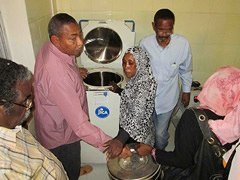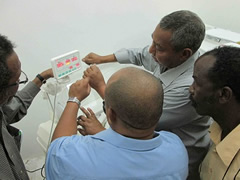- Home
- Technical Cooperation Projects
- Index of Countries
- Africa
- Sudan
- Frontline Maternal and Child Health Empowerment Project Phase II
- Project News
- Equipment User Training in Sinnar State
Project News
2014-08-11
Equipment User Training in Sinnar State
Frontline Maternal and Child Health Empowerment Project (Mother Nile Project) Phase 2 (MNP2) conducts in-service training for capacity building of Village Midwives (VMWs) and supports VMWs to refer expected mothers to health facilities when dealing with difficult pregnancies.
There is an insufficiency of medical equipment in the targeted hospitals needed for safe deliveries, MNP2 provided ted medical equipment to Sinnar Teaching Hospital, Suki Locality Hospital, Wadanil Rural Hospital in Sinnar State in the first year of the project.
In the second year of the project, MNP2 confirmed with hospital staff for the proper use and maintenance of the equipment. The project aimed at proper maintenance of the equipment which enables expected mothers to have access for improved medical services even after the end of the project.
It is essential for the health care workers to increase the knowledge of maintenance for proper utilization of medical equipment without breakdown in the health facilities.
In February 2014, MNP2 made a guideline for daily maintenance and usage of the donated medical equipment, and shared the guideline with health care providers of the targeted hospitals.
MNP2 applied procedural memo to the each medical equipment so that the staff could refer to the memo every time they use the equipment.
MNP2 attempted to reinforce future collaboration among Federal Ministry of Health (FMOH), State Ministry of Health (SMOH) and health facilities. MNP2 conducted equipment user training for health care providers with the assistance from experienced engineers of the Central Medical Supply (CMS).
Not only health care providers of the Sinnar Teaching Hospital, Suki Locality Hospital, and Wadanil Rural Hospital but also personals responsible for medical equipment of SMOH were able to learn a lot about the trouble management and repair in the field.
We were able to make a stir in strengthen collaboration with FMOH, SMOH and health facilities by our training with technical exchange.
One of the engineers of CMS said, "Until now, I did not know what the problems with health care providers are. Now I was able to understand their needs. I have not had an opportunity for passing our experience and skills until now, I am happy engaging in skill transfer to the staff in the field through this training."
By promoting quarterly technical exchange in the future, it will become an opportunity to the relationship-building to transfer the skills and to enhance cooperation with younger health care workers in the future.


- About JICA
- News & Features
- Countries & Regions
- Our Work
- Thematic Issues
- Types of Assistance
- Partnerships with Other Development Partners
- Climate Change / Environmental and Social Considerations
- Evaluations
- Compliance and Anti-corruption
- Science and Technology Cooperation on Global Issues
- Research
- JICA Development Studies Program / JICA Chair
- Support for the Acceptance of Foreign HRs / Multicultural and Inclusive Community
- Publications
- Investor Relations
